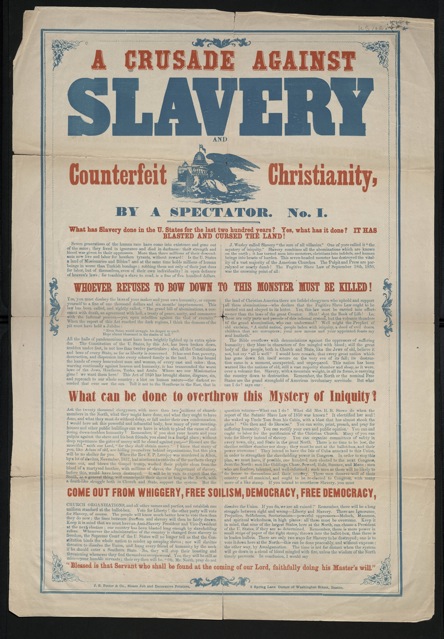Introduction

From the Revolution through Reconstruction, Boston led the national crusade against slavery and the struggle over emancipation and citizenship. Owing largely to activists in Boston, Massachusetts became one of the first states to end slavery, and throughout the antebellum era it granted black men unrestricted suffrage. It was the first state to end the ban on interracial marriage (in 1843), the first to desegregate public schools (in 1855), the first to admit black jurors (in 1860), and the first northern state to raise a black regiment during the Civil War. Black and white Bostonians, collaborating with the city's political, religious, intellectual, and business leaders, were instrumental in undermining conservative defenses of slavery and in convincing the Lincoln administration to turn a conflict fought chiefly to preserve the Union into a war for emancipation and black citizenship.
Boston's Crusade Against Slavery features objects from the extraordinary collection at Houghton Library to highlight Boston's role in the international fight for freedom. Each case focuses on a theme connecting Boston to the larger crusade against slavery. Each object constitutes an important marker in the crusade. Many are on display for the first time, and have rarely, if ever, been analyzed by scholars.
This exhibition has been curated by students enrolled in a two-part course on Emancipation, English 90eo and 90et, under the direction of Professor John Stauffer, Department of English, Harvard University; Peter X. Accardo, Houghton Library Public Programs Librarian; and Ryan McNabb, National Park Ranger, Boston African American National Historic Site; and in conjunction with the public symposium, "Freedom Rising," a three-day event commemorating the 150th anniversary of the Emancipation Proclamation and African American military service.
The curatorial team wishes to express its special thanks to William P. Stoneman, Florence Fearrington Librarian, and the staff of Houghton Library for their support of this project since its inception.
BOSTON'S CRUSADE AGAINST SLAVERY John Stauffer, Professor of English, African and African American Studies, and History of American Civilization
EMIGRATION AND IMAGINATION: BOSTON'S CONNECTION WITH HAITI Josiah Bonsey, History and Literature, Class of 2014
AN AGE OF COMPROMISE AND CRISES, 1820-60 Balraj Gill, Ph.D. Program on the History of American Civilization
MILITANT BOSTON Ryan McNabb, National Park Ranger, Boston African American National Historic Site
MUSIC AS MEMORY: SPIRITUALS, MINSTRELSY, AND MARCHING SONGS DURING THE AGE OF ABOLITIONISM Kristine Lee, History and Literature, Class of 2014
A WOMAN AND A SISTER TOO? THE INTERTWINING OF EMANCIPATION AND EARLY FEMINISM Suzanna Bobadilla, History and Literature, Class of 2013
CONCORD TRANSCENDENTALISTS AND THE LEGACY OF JOHN BROWN Caroline Vernick, History and Literature, Class of 2014
THE SATURDAY CLUB AND ITS CONTRIBUTION TO THE CRUSADE Samuel Greenberg, History and Literature, Class of 2014
"CAMBRIDGE TO THE RESCUE" Alexander Heffner, History, Class of 2013
"A RACE SET FREE": THOMAS BALL'S FREEDMEN'S MONUMENT Mary Gabrielle Prezioso, English, Class of 2013
This online version of Boston's Crusade Against Slavery was created by Han Yan, Class of 2013, through the generosity of the Library Instruction Technology Fellow Program, and Enrique Diaz, Designer/Multimedia Specialist, Harvard Library.